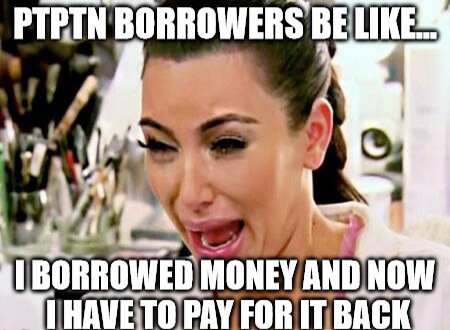“Pokai lah,” (broke) or “duit dah kering” (no more money). Familiar with those phrases? Chances are, you have used it yourself, or have heard your friends or family using it. Read on to find out the common money mistakes Malaysians made in 2018.
I'll Get It!
Whether it is pride, Malaysian hospitality, or the need to show off, this usually happens during lepak sessions or when you go out for meals together. There are some individuals who always offer to pay for the bill, and then refuse to take money from others who would like to pay for their own meal.
It’s fine if you can afford to do so. But if you can’t actually afford to pay for all of the meals, this can land you in trouble, like being pokai before receiving your next salary. I had a friend with debt problems, and who was even being hounded by debt collectors. Yet this friend always insisted on paying for all of our meals when we ate out together. You don’t have to prove anything to your friends by paying for their meals, especially when you’re struggling to pay off your debt.
I got, You Got or Not?
Some indulge their need to impress and often spend much of their time trying to keep up with the Jones’. Sometimes, who you are seen with and the clothes you are wearing is given an inflated importance in our society. So much so, that people spend all their hard-earned income just to keep up with the trends.
Every time Raya rolls around, there are individuals who go all out to get new curtains and furniture for their home. In extreme cases, there are even those who insist on “upgrading” to a new car every year so they can show it off when they balik kampung.
Another example is throwing lavish wedding ceremonies when you can’t afford it in the first place. This is becoming a prevalent problem in Malaysia, and is causing young Malaysians to get into financial and marital problems upon tying the knot.
Being A Penny-Pincher
A cheapskate can mean many things that you’re either always on the lookout for a great bargain or you’re too cheap to recognize value of goods and services.
In some cases, this might mean seeking out cheaper alternative, or choosing to buy fake goods in the hopes of saving money. But when the item stops working or worse, when it breaks apart, they complain. It shouldn’t come as a surprise that a cheaper item will also mean a lower quality item. The constant need to complain is another Malaysian problem, but that is another topic for another day.
When you purchase an original item, although you have to pay more, you’re essentially also paying for its top-notch quality. This helps to ensure that the item works properly and will also last longer. For example, when you get your car fixed, you should use original spare parts instead of cheaper alternatives to ensure its safety and longevity of usage. Being a cheapskate doesn’t always help you save money, in fact it can cause you to have to spend more money instead!
See also: Things You Should Never Buy Cheap
Distorted Perceived Value
Malaysians have a thing about perceived value. For example, we are willing to pay a high price just for a cup of coffee from a fancy coffee shop because of the perceived cool factor that exists. Or we think that just because it’s from an upmarket shop the price is justified. But if we are asked to pay RM15 for a juice, or perhaps organic food, we tend to be highly against it and would potentially complain about it. We don’t understand the value of the (better) drink so we complain it’s too expensive. Yet, the value of RM15 is the same as the one we spend on our ridiculously overpriced coffee. We also tend to think that if it’s from an international brand, it’s always going to be of high quality, and don’t mind paying more. But if it’s locally made, we get annoyed if it has an expensive price tag.
Kiasu a.k.a Fear of Missing out (FOMO)
You can see the kiasu side of Malaysians when price hikes are announced, such as petrol prices. You will then see long queues of cars at the petrol station. Those are people hoping to save money by pumping petrol before the price goes up. But either they forget or choose to ignore that fact that they waste time and their existing petrol just to “save” a few Ringgit, and the fact that they will still have to pump petrol even after the price hike.
Or if we hear that there will be a price hike for sugar the next day, we rush to the supermarket or nearest kedai runcit to sapu all of the sugar we can get our hands on, even if we don’t consume that much sugar to begin with. Remember the cooking oil fiasco? It made headlines as Malaysians nationwide were in a hurry to ensure they had enough cooking oil for a year and many supermarkets were out of stock!
That’s the Malaysian kiasu for you.

You Feel Entitled
We expect to get things for free. This is most notable with the PTPTN loan. Admit it, most Malaysians feel entitled to discounts AND free gifts when purchasing items. You buy something from a shop and you won’t feel satisfied until you receive a free gift. Which is not always bad, but, when it comes to PTPTN, some Malaysians also have the same entitlement mindset, which then becomes a problem.
PTPTN borrowers will soon have to repay their loans in specific amounts depending on their monthly income by automatic deduction – whether they like it or not. PTPTN will be working with several different agencies such as EPF to carry out the PGB, Potongan Gaji Berjadual. Want to know how much you’ll have to repay? Read on to find out.
Wan Saiful Wan Jan, chairman of PTPTN, said that PTPTN will be moving forward with the salary deduction scheme for PTPTN repayment with PGB, Potongan Gaji Berjadual. This is inline with the announcement by Finance Minister Lim Guan Eng in the 2019 Budget.
PTPTN PGB Rates
The scheme will see the following deductions (by percentage) according to the monthly income:
RM2,000 and below = 0%
RM2,001 to RM2,499 = 2% (RM40 – RM49.99)
RM2,500 to RM2,999 = 3% (RM75 – RM89.99)
RM3,000 to RM3,999 = 5% (RM150 – RM199.99)
RM4,000 to RM5,999 = 8% (RM320 – RM479.99)
RM6,000 to RM7,999 = 10% ( RM600 to RM799.99)
RM8,000 and above = 15% (RM1,200 and above
PTPTN Repayment Exemption
There will, of course, be exemptions to the repayment. Students can be exempted from the loan repayment, provided they fulfill the following requirements:
Obtain first-class honours
Complete their studies in 2019
Full-time students
Complete studies within the given time frame
From B40 and M40 households after study completion
Later Can Pay One
When you spot a long queue at the bank, or if the LHDN website is extremely slow, you know that thousands of Malaysians have left an errand to its absolute last minute. As with the signature to pin card replacement, we were informed months ahead to do so. Yet, there were long queues at the banks to change the cards, a few days before the deadline. Some people even had to wait for 4 hours to get their new card. This last minute attitude cost us to end up wasting time and worse, sometimes we also get fined for it.
The Chill Lah Attitude
This rilek or lepak attitude is so engrained in our culture, especially with our younger generations. At times, it’s cool to take it easy, but not when it bites you back.BNM Assistant Governor Jessica Chew revealed that 92% of Malaysians are worried about their financial health. That's not it, a global survey from the World Bank found that only 36% of Malaysians are considered financially literate.
We’re not doing ourselves any favours by being ignorant when it comes to financial literacy. Do you know what compound interest, rule of 78, or the difference between a good and bad debt? Understanding how money works will protect yourself from making potentially expensive mistakes.Check out our blog where we simplify financial issues to make it easy to understand and relatable. Ignorance is not always bliss, especially when it comes to money matters.
See also: Take this Global Financial Literacy Quiz – Will You Pass?
Save
Save
Save
Save
Save
Save
Save
Save
Save
Save
Save









.png?width=280&name=FI_Lazy_Person_s_Guide_to_Achieving_Financial_Freedom_with_Minimal_Effort-01%20(1).png)

